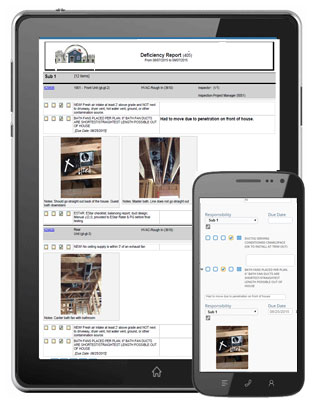The work with old style punch lists begins in the job trailer where you have to log in your issues, organize them, email them, track them, and following-up. You spend more time in the trailer than on the Construction Site. Now, with FTQ360's Punch List Automation feature, you really shouldn’t be spending any time in the trailer at all.
FTQ360's new capabilities in punch list automation let you simply and efficiently create punch lists in the field and not touch them again until corrections need your approval.
What is a Punch List
The punch list, also known as a snag list, is a document showing work that still needs to be completed in a construction project or any other type of project. It is typically created near the end of the project, once the majority of the work has been completed.
The compilation of the punch list involves the project manager, contractor, or client and encompasses tasks or issues demanding resolution prior to project finalization. This pivotal construction project management aspect includes assigning tasks, overseeing construction project documentation, and ensuring effective task execution. The punch list addresses any outstanding items like repairs, touch-ups, or installations that remain pending from the primary construction or renovation phase.
The purpose of the punch list is to ensure that all parties involved in the project are on the same page about what still needs to be done. It serves as a checklist to make sure that all tasks are completed to the satisfaction of the client or project owner.
Once the punch list is created, it is typically shared with all relevant parties, including contractors, subcontractors, and suppliers. They are then responsible for completing the items on the list within a specified timeframe.
The completion of the punch list is often a contractual requirement and is commonly used to determine when final payment will be made by the client. Once all items on the punch list have been addressed and completed, the project is considered finished and the final payment can be made.
Overall, the punch list process is an important tool in the construction industry for task management to ensure that all work is completed to the necessary standards and specifications before a project is officially considered complete.
New Punch List Automation Features:
- Auto-sort and notify.
FTQ360 notifications from the field go well beyond click and send now (so 1.0!). With Punch List 2.0, the system organizes the punch items by responsible party and automatically email them their new items. - Automated follow-up and tracking.
"Overdue Punch Item” reminder emails are automatically sent. Status reports track the backlog and go out weekly to responsible parties and project managers. - Integration of punch lists and checklists for Quality Control
Deficiencies on checkpoints automatically become punch items. In this way, checklists function as punch lists until the items are closed and you pass the inspection. - Shared (but controlled) access.
Responsible parties can document their own corrections with pictures and information and alert you that the item is ready for your review.
3 Ways Punchlist Automation Will Save Time
- in-line punch list software: This innovation allows for the comprehensive documentation of all issues on a single, easily accessible punch list screen. This capability proves especially advantageous in the context of managing complex construction projects. Moreover, the efficiency of this process can be heightened through the seamless integration of effective project management software solutions.
- Corrected item tracking.
PASS/FAIL checkpoints are not enough. Eventually each checkpoint is set to “PASS” leaving you no useful information on corrected items. FTQ360 tracks items that are corrected, providing valuable data for analysis. - Data analytics for operations. Employing a construction management tool serves as the cornerstone for comprehensive data analytics within operations.
This strategic approach yields insights into pivotal questions: Which checkpoints exhibit the highest frequency of deficiencies, and how do subcontractors and crews factor into this? Is the overall trend indicative of improvement or regression? The ability to adeptly address such inquiries stands as a linchpin for refining and enhancing operations across both residential and commercial builders.
Furthermore, incorporating the best punch list software seamlessly complements this process, ensuring meticulous project oversight at every phase of construction and helping you manage entire projects.
Don’t settle for automating manual processes when technology can do the work for you.
Sign up for a free trial or live demo.



